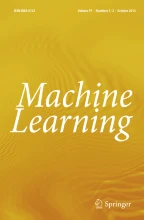Abstract
This paper extends the game-theoretic notion of internal regret to the case of on-line potfolio selection problems. New sequential investment strategies are designed to minimize the cumulative internal regret for all possible market behaviors. Some of the introduced strategies, apart from achieving a small internal regret, achieve an accumulated wealth almost as large as that of the best constantly rebalanced portfolio. It is argued that the low-internal-regret property is related to stability and experiments on real stock exchange data demonstrate that the new strategies achieve better returns compared to some known algorithms.
Article PDF
Similar content being viewed by others
Explore related subjects
Discover the latest articles, news and stories from top researchers in related subjects.Avoid common mistakes on your manuscript.
References
Auer, P., Cesa-Bianchi, N., & Gentile, C. (2002). Adaptive and self-confident on-line learning algorithms. Journal of Computer and System Sciences, 64, 48–75.
Blackwell, D. (1956). An analog of the minimax theorem for vector payoffs. Pacific Journal of Mathematics, 6, 1–8.
Blum, A. & Kalai, A. (1999). Universal portfolios with and without transaction costs. Machine Learning, 35, 193–205.
Blum, A. & Mansour, Y. (2004). From external to internal regret. Manuscript.
Borodin, A., El-Yaniv, R., & Gogan, V. (2000). On the competitive theory and practice of portfolio selection (extended abstract). Proc. of the 4th Latin American Symposium on Theoretical Informatics (LATIN’00) (pp. 173–196). Uruguay: Punta del Este.
Cesa-Bianchi, N. & Lugosi, G. (1999). On prediction of individual sequences. Annals of Statistics, 27, 1865–1895.
Cesa-Bianchi, N. & Lugosi, G. (2000). Minimax values and entropy bounds for portfolio selection problems. Proceedings of the First World Congress of the Game Theory Society.
Cesa-Bianchi, N. & Lugosi, G. (2003). Potential-based algorithms in on-line prediction and game theory. Machine Learning, 51.
Cover, T. (1984). An algorithm for maximizing expected log investment return. IEEE Transactions on Information Theory, 30, 369–373.
Cover, T. M. (1991). Universal portfolios. Mathematical Finance, 1, 1–29.
Cover, T. M. & Ordentlich, E. (1996). Universal portfolios with side information. IEEE Transactions on Information Theory, 42, 348–363.
Foster, D. & Vohra, R. (1998). Asymptotic calibration. Biometrica, 85, 379–390.
Foster, D. & Vohra, R. (1999). Regret in the on-line decision problem. Games and Economic Behavior, 29, 7–36.
Fudenberg, D. & Levine, D. (1999). Universal conditional consistency. Games and Economic Behavior, 29, 104–130.
Greenwald, A. & Jafari, A. (2003). A general class of no-regret learning algorithms and game-theoretic equilibria. Proceedings of the 16th Annual Conference on Learning Theory and 7th Kernel Workshop (pp. 2–12).
Hannan, J. (1957). Approximation to Bayes risk in repeated play. Contributions to the Theory of Games, 3, 97–139.
Hart, S. & Mas-Colell, A. (2000). A simple adaptive procedure leading to correlated equilibrium. Econometrica, 68, 1127–1150.
Hart, S. & Mas-Colell, A. (2001). A general class of adaptive strategies. Journal of Economic Theory, 98, 26–54.
Helmbold, D. P., Schapire, R. E., Singer, Y., & Warmuth, M. K. (1998). On-line portfolio selection using multiplicative updates. Mathematical Finance, 8, 325–344.
Ordentlich, E. & Cover, T. M. (1998). The cost of achieving the best portfolio in hindsight. Mathematics of Operations Research, 23, 960–982.
Singer, Y. (1997). Switching portfolios. International Journal of Neural Systems, 8, 445–455.
Stoltz, G. & Lugosi, G. (2004). Learning correlated equilibria in games with compact sets of strategies. Manuscript.
Author information
Authors and Affiliations
Corresponding author
Additional information
Editor
Philip M. Long
An extended abstract appeared in the Proceedings of the 16th Annual Conference on Learning Theory and 7th Kernel Workshop, Springer, 2003. This article is invited by Machine Learning.
The work of Gilles Stoltz was supported by PAI Picasso grant 02543RM and by the French CNRS research network AS66 (SVM and kernel algorithms), and the work of Gábor Lugosi was supported by DGI grant BMF2000-08.
Rights and permissions
About this article
Cite this article
Stoltz, G., Lugosi, G. Internal Regret in On-Line Portfolio Selection. Mach Learn 59, 125–159 (2005). https://doi.org/10.1007/s10994-005-0465-4
Received:
Revised:
Accepted:
Issue Date:
DOI: https://doi.org/10.1007/s10994-005-0465-4
